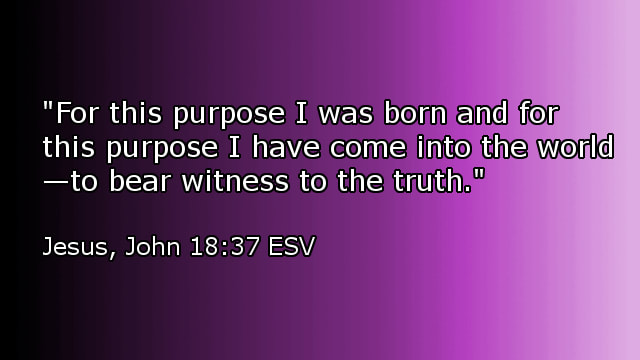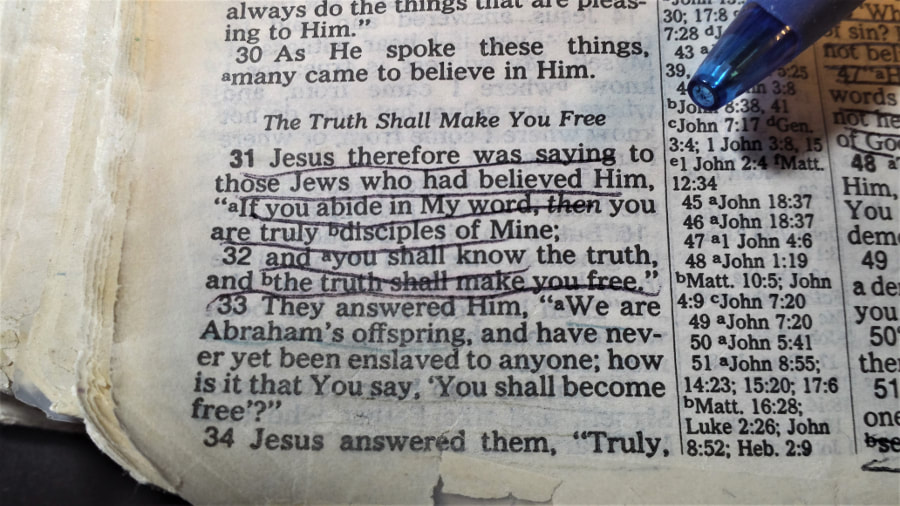Then Pilate said to him, "So you are a king?" Jesus answered, "You say that I am a king. For this purpose I was born and for this purpose I have come into the world—to bear witness to the truth. Everyone who is of the truth listens to my voice." (John 18:37)
This lesson is the fifth and final in the series, "About the Truth."
Consider. Do you consider yourself to be a person “of the truth”? Are you listening to the voice of Jesus who is the truth?
Introduction. In today's scripture (John 18:37), Jesus was facing Pilate, the representative of the highest political authority on earth (Ref. 1). Jesus courageously and nobly said to Pilate that he was born to be a king and came into the world - to bear witness to the truth. Ellicott's Commentary says the natural interpretation (based on Greek verb tenses) is "To be king I have been born, and to be a king I have come into the world, in order that I may bear witness to the truth" (Ref. 2).
Pilate asked Jesus, "So you are a king?" (John 18:37). However, Jesus' kingdom was not a kingdom in the political sense that Pilate inferred (Ref. 1, Ref. 3). Jesus' kingdom was a kingdom in the spiritual sense (Ref. 4). Jesus said, "My kingdom is not of this world" (John 18:36). Jesus said, "For this purpose I have come — to bear witness to the truth."
Let's look at the meaning of the words for bear witness and truth. The English words bear witness are translated from the Greek verb martureó, which means bear witness, give evidence, testify, give a good report (Ref. 5). The Greek noun for truth is alétheia, which means reality, the opposite of what is false or illusion (Ref. 6). Jesus came into the world to show and tell mankind that God's truth is reality.
Consider these statements where Jesus bears witness to God's truth -- reality. "I am the way, and the truth, and the life; no one comes to the Father but through Me" (John 14:6). "If you continue in My word, then you are truly disciples of Mine; and you will know the truth, and the truth will make you free" (John 8:31-32). "For God so loved the world, that He gave His only begotten Son, that whoever believes in Him shall not perish, but have eternal life" (John 3:16). The above verses and the entirety of the Holy Bible are God's truth and are reality. "The entirety of Your word is truth, and all Your righteous judgments endure forever" (Psalm 119:160). Jesus said, "Everyone who is of the truth listens to my voice."
To whom is Jesus referring when he says "Everyone who is of the truth listens to my voice"? (John 18:37) People of the truth are people who listen to the voice of him who is the truth (Ref. 7). Jesus said, "My sheep hear My voice, and I know them, and they follow Me" (John 10:27).
Listening to (hearing) Jesus' voice prompts obedience (Ref. 8). People who are of the truth hear Jesus' words and yield obedience to him. Jesus said, "If you love me, you will keep my commandments" (John 14:15).
Apply. Listen to the voice of Jesus who has testified about God’s truth, which is reality. Testify to others about the reality of God in your life. Obey God’s words.
Related Lessons
"God's Truth in the Old Testament" (Psalm 119:160) "Jesus is the Truth" (John 14:6) "Know the Truth (John 8:32)" "The Spirit of Truth" (John 16:13-14)
References
1. https://biblehub.com/commentaries/jfb/john/18.htm 2. https://biblehub.com/commentaries/ellicott/john/18.htm 3. https://biblehub.com/commentaries/pulpit/john/18.htm 4. https://biblehub.com/commentaries/poole/john/18.htm 5. https://biblehub.com/greek/3140.htm 6. https://biblehub.com/greek/225.htm 7. https://biblehub.com/commentaries/ellicott/john/18.htm 8. https://biblehub.com/greek/191.htm
0 Comments
Copyright: digitalskill / 123RF Stock Photo
"But when He, the Spirit of truth, comes, He will guide you into all the truth; for He will not speak on His own initiative, but whatever He hears, He will speak; and He will disclose to you what is to come. He will glorify Me, for He will take of Mine and will disclose it to you." (John 16:13-14)
"The Holy Spirit is our Guide, not only to show us the way, but to go with us by continued aids and influences." -- Matthew Henry (Ref. 1)
This lesson is the fourth in the series, "About the Truth." Today's lesson focuses on the role of the Holy Spirit as the "Spirit of Truth."
Consider.
Jesus promised his disciples that the Spirit of truth would come.
Jesus was speaking to his disciples on the evening before his death. In the beginning of John 16:13, Jesus told them that the Spirit of truth would come. God fulfilled the promise of sending the Holy Spirit, the Spirit of truth, beginning at Pentecost (Acts 2:1-4). Jesus' promise of sending the Holy Spirit, the Spirit of truth, continues for believers to this day (Acts 2:37-39).
The Spirit of truth guides believers into all the truth.
The Greek word in John 16:13 for guide is the verb, hodégeó. Strong's Concordance tells us that hodégeó means to show the way -- to teach, guide, lead (Ref. 2).
In Acts 8:25-40, we see an example of what it means to guide. An angel of the Lord sent Philip to the road that descends from Jerusalem to Gaza (Acts 8:26). There Philip met the chariot of an Ethiopian eunuch who was returning from Jerusalem. At the Spirit's direction, Philip joined the eunuch in the chariot (Acts 8:29). The eunuch was reading Isaiah the prophet. Philip asked him, "Do you understand what you are reading?" (Acts 8:30) The eunuch replied, "Well, how could I unless someone guides me?" (Acts 8:31, italics added) Philip explained the scripture to the eunuch and "preached Jesus to him" (Acts 8:35). As the result, the Ethiopian eunuch believed that Jesus Christ is the Son of God (Acts 8:37), and Philip baptized him (Acts 8:38). Note what Jesus said in John 16:13. "He (the Spirit of truth) will guide you into all the truth." In his commentary, Charles John Ellicott (1819–1905) says that the words, "all the truth," mean that the Spirit of truth "will be their guide into the fulness [sic] of truth." Ellicott adds, "The promise has special meaning for the disciples to whom it was spoken; but it holds good for every disciple who seeks to know the truth" (Ref. 3, Ref. 4). The Spirit of truth speaks what he has heard from the Father and the Son.
The Holy Spirit does not speak from himself. The Holy Spirit fulfills his mission when he speaks truth directly from the Father and Son to the believer. The King James Version translates the verse well. "When he, the Spirit of truth, is come, he will guide you into all truth: for he shall not speak of himself; but whatsoever he shall hear, that shall he speak" (John 16:13, italics added).
The Spirit of truth glorifies the Son.
Jesus said, "He will glorify Me, for He will take of Mine and will disclose it to you" (John 16:14). The Greek word for glorify in John 16:14 is doxazó, which means make glorious, honor, magnify (Ref. 5 below). Doxazó is very similar to the Greek word doxa, which means to honor, praise, worship (Ref. 5). When we sing the Doxology in a worship service we express our praise and worship of God (Ref. 6). When the Holy Spirit guides us into truth, it is an act of worship that glorifies Jesus, the Son of God.
Prayer. Thank you, Lord, for sending the Spirit of truth to be with us and to guide us into all of your truth.
Related Lessons
"God's Truth in the Old Testament" (Psalm 119:160) "Jesus is the Truth" (John 14:6) "Know the Truth (John 8:32)" "Jesus - Witness to the Truth" (John 18:37)
References
1. https://biblehub.com/commentaries/mhc/john/16.htm 2. https://biblehub.com/greek/3594.htm 3. https://biblehub.com/commentaries/john/16-13.htm 4. https://en.wikipedia.org/wiki/Charles_Ellicott 5. James Strong, "The New Strong's Exhaustive Concordance of the Bible," Thomas Nelson Publishers, 1995 - note, based on the King James Version of the Bible 6. http://www.hymntime.com/tch/htm/d/o/x/doxology.htm
"Then Jesus said to those Jews who believed Him, 'If you abide in My word, you are My disciples indeed. And you shall know the truth, and the truth shall make you free.' " (John 8:31-32)
This lesson is the third in the series, "About the Truth." The first lesson was "God's Truth in the Old Testament" where we learned that God's Word in its entirety is truth (Psalm 119:160). The second lesson was "Jesus is the Truth" based on John 14:6. This lesson discusses Jesus' instructions to believers to abide in the Word and to know the truth experientially.
Consider.
To whom was Jesus speaking?
When Jesus spoke the promise, "You shall know the truth, and the truth shall make you free," Jesus was speaking to people who believed him. That is, Jesus was speaking to people who had faith in him and who trusted him. The beginning of John 8:31 states, "So Jesus was saying to those Jews who had believed Him ..."
Believe in Jesus.
Jesus does not ask us to believe a truth, or any truth (Ref. 1). Jesus asks us to believe that He is the truth (John 14:6). If you have never put your trust in Jesus, or if you have strayed away from Jesus, put your trust in him today. Believing in Jesus who is the Truth will set you free from slavery to sin, and will give you eternal life.
"Therefore there is now no condemnation for those who are in Christ Jesus. For the law of the Spirit of life in Christ Jesus has set you free from the law of sin and of death" (Romans 8:1-2). "For God so loved the world, that He gave His only begotten Son, that whoever believes in Him shall not perish, but have eternal life" (John 3:16). Abide in the Word and know the truth experientially.
Jesus says to believers in the second portion of John 8:31 and in verse 32, "If you abide in My word, you are My disciples indeed. And you shall know the truth, and the truth shall make you free." The Greek word for abide is menó which means remain, abide (Ref. 2). As believers in Christ, we are to abide in the Word, and persevere in studying, learning, and applying God's Word.
Jesus says that if we abide in the Word we will know the truth experientially (John 8:31-32). The Greek word for know is ginóskó which means to know, especially through personal experience (first-hand acquaintance) (Ref. 3). Knowing the truth experientially requires knowing Jesus who is the truth, as well as knowing and living the Word of God on a daily and life-long basis.
Jesus says that if we abide in the Word we will know the truth and the truth will make us free (John 8:31-32). The Greek verb make free is eleutheroó which means liberate, set free, release from bondage (Ref. 4). When we trust Jesus as our Lord and Savior, abide in his Word, and grow in knowledge of his truth, we are set free from slavery to sin. Jesus says, "Truly, truly, I say to you, everyone who commits sin is the slave of sin" (John 8:34). "So if the Son makes you free, you will be free indeed" (John 8:36).
Billy Graham Quote
I will end this post with a quote from Billy Graham's message, "What is Truth?" (Ref. 1)
"Turn to Christ—to the truth. Jesus said, 'You shall know the truth, and the truth shall make you free' (John 8:32). He said, 'I am … the truth' (John 14:6). Jesus did not say, 'You shall know a truth' or 'any truth' but 'the truth.' He’s the embodiment of all truth. Jesus said, 'If you do not believe that I am He, you will die in your sins' (John 8:24). If you don’t believe that and don’t accept Christ, you will die in your sins and you’ll be lost. Jesus Christ claimed to be ultimate truth. Are you willing to face the truth?" (Ref. 1)
Apply. Are you willing to face the ultimate truth of Jesus Christ? Will you put your faith and trust in him? What steps will you take to abide in God's Word and to grow in your knowledge of the truth?
Related Lessons
"God's Truth in the Old Testament" (Psalm 119:160) "Jesus is the Truth" (John 14:6) "The Spirit of Truth" (John 16:13-14) "Jesus - Witness to the Truth" (John 18:37)
References
1. https://billygraham.org/decision-magazine/march-2017/classic-message-billy-graham-truth/ ©1985 Billy Graham Evangelistic Association. Used with permission. All rights reserved. 2. https://biblehub.com/greek/3306.htm 3. https://biblehub.com/greek/1097.htm 4. https://biblehub.com/greek/1659.htm
Jesus said to him, "I am the way, and the truth, and the life; no one comes to the Father but through Me" (John 14:6).
"Truth is not defined by our own subjective standards; it is determined by the Source of truth Himself" (R.C. Sproul - Ref. 1).
This is the second lesson in the series, "About the Truth." The first lesson described God's Truth in the Old Testament. Today we begin to examine what the New Testament says about God's truth.
Definition. The Greek word for truth in the New Testament is alétheia, pronounced phonetically as "al-ay'-thi-a." In ancient Greek culture, alétheia was synonymous for "reality" as the opposite of illusion, i.e. fact (Ref. 2).
Alétheia occurs 109 times in the New Testament (Ref. 2). John's gospel and John's letters (1 John, 2 John, 3 John) mention truth the most often, where alétheia is mentioned 47 times. According to Strong's Exhaustive Concordance (Ref. 3 below), Jesus verbally mentioned truth (alétheia) 26 times. The first reference is Luke 4:25-26. The last reference is John 18:37, which we will examine later in this lesson series.
Consider. Let's consider what Jesus' critics said about Jesus and what Jesus said about himself in regard to the truth.
Jesus' critics recognized that Jesus taught the truth.
In Matthew 22:15-22, the Pharisees went to Jesus with a question intended to trap him. Verse 16 tells us, "And they sent their disciples to Him, along with the Herodians, saying, "Teacher, we know that You are truthful and teach the way of God in truth, and defer to no one; for You are not partial to any."
Perhaps the Pharisees were being falsely complimentary of Jesus because they did not believe in him (Barnes in Ref. 4). However, this was "an admission from the lips of adversaries of the supreme truthfulness and fearlessness of our Lord’s teaching" (Ellicott in Ref. 4). In either case, the words of Jesus' critics recognized that Jesus was truthful (aléthés, unconcealed) and that he taught the truth (alétheia, reality) (Ref. 2, Ref. 5). Jesus is the Truth.
On the evening before his death, Jesus told his disciples that he was about to leave them (John 13:33). Thomas asked Jesus, "Lord, we do not know where You are going, how do we know the way?" (John 14:5). Jesus replied, "I am the way, and the truth, and the life; no one comes to the Father but through Me" (John 14:6).
When Jesus said that he is the truth, he was saying that he is the embodiment and fulfillment of the Word of God, and that he is alétheia, reality, the opposite of what is false or illusion. In the previous post (July 15, 2018), we read Psalm 119:160, "The entirety of Your word is truth, and all Your righteous judgments endure forever." In the Sermon on the Mount, Jesus said, "Do not think that I came to destroy the Law or the Prophets. I did not come to destroy but to fulfill" (Matthew 5:17). John begins his gospel with, "In the beginning was the Word, and the Word was with God, and the Word was God" (John 1:1). When Jesus prayed with the Father on the evening before his death, Jesus said, "Thy word is truth" (John 17:17). Jesus not only taught the truth, but also embodied the truth perfectly because he (and only he) was sinless and because Jesus is God (Luke 23:39-41, Hebrews 4:15, John 8:58, Exodus 3:6).
Apply. Jesus said, "I am the way, and the truth, and the life; no one comes to the Father but through Me" (John 14:6). Do you agree that Jesus rather than man is the Source of truth?
Related Lessons
"God's Truth in the Old Testament" (Psalm 119:160) "Know the Truth (John 8:32)" "The Spirit of Truth" (John 16:13-14) "Jesus - Witness to the Truth" (John 18:37)
References
1. https://www.ligonier.org/learn/devotionals/god-truth/References 2. http://biblehub.com/greek/225.htm 3. James Strong, "The New Strong's Exhaustive Concordance of the Bible," Thomas Nelson Publishers, 1995 - note, based on the King James Version of the Bible 4. http://biblehub.com/commentaries/matthew/22-16.htm 5. http://biblehub.com/greek/227.htm
"The entirety of Your word is truth, and all Your righteous judgments endure forever" (Psalm 119:160).
This article is the first in the series, "About the Truth." This article focuses on what the Old Testament says about God's truth.
The Truth of God in the Old Testament
Definition. The main Hebrew word for "truth" in the Old Testament is emeth. Emeth means "firmness, faithfulness, truth" (Ref. 1).
The word emeth first occurs in Genesis 24:27, when Abraham's servant completes his journey to find a bride for Abraham's son, Isaac. “Blessed be the Lord God of my master Abraham, who has not forsaken His mercy and His truth toward my master. As for me, being on the way, the Lord led me to the house of my master’s brethren.”
Consider. Let's look together at several verses which describe the attributes, or characteristics, of God's truth.
God's commandments are truth itself.
"Your righteousness is an everlasting righteousness, And Your law is truth" (Psalm 119:142).
"You are near, O Lord, And all Your commandments are truth" (Psalm 119:151). "The entirety of Your word is truth, and all Your righteous judgments endure forever" (Psalm 119:160). Think ahead to Pilate's question to Jesus, "What is truth?" (John 18:38). The writer of Psalm 119 answers Pilate's question. God's word is truth. God's truth leads us and guides us. Zion National Park, Utah with Psalm 25:5 - Photo by Whitney V. Myers Zion National Park, Utah with Psalm 25:5 - Photo by Whitney V. Myers
David prayed, "Lead me in your truth and teach me, for you are the God of my salvation; for you I wait all the day long" (Psalm 25:5).
John the disciple confirmed this principle when he quoted Jesus. "But when He, the Spirit of truth comes, He will guide you into all the truth" (John 16:13). God's truth protects us.
In Psalm 91, the psalmist writes, "He will cover you with His pinions, And under His wings you may seek refuge; His faithfulness (emeth, truth) is a shield and bulwark" (Psalm 91:4, italics added). Merriam-Webster defines a bulwark as a solid wall-like structure raised for defense (Ref. 2).
David expressed his confidence in God's truth to protect him. "Lord, do not withhold Your compassion from me; Your constant love and truth will always guard me" (Psalm 40:11). Recall how Jesus used God's truth (from the Old Testament) to defend himself from Satan's temptations and to end Satan's attack (Matthew 4:1-11). God's truth is everlasting.
"For His lovingkindness is great toward us, And the truth of the Lord is everlasting. Praise the Lord!" (Psalm 117:2)
Martin Luther confirmed this principle in "A Mighty Fortress is our God" when he wrote, "God's truth abideth still" (Ref. 3). As believers in Christ, God's truth is our standard. God's truth endures forever and does not change.
Apply. Let's review the four principles in this lesson:
1. God's commandments are truth itself (Psalm 119:160) 2. God's truth leads us and guides us (Psalm 25:5) 3. God's truth protects us (Psalm 91:4) 4. God's truth is everlasting (Psalm 117:2) How can you apply these principles to your life today?
Related Lessons
"Jesus is the Truth" (John 14:6) "Know the Truth (John 8:32)" "The Spirit of Truth" (John 16:13-14) "Jesus - Witness to the Truth" (John 18:37) |
Daily Bible Verse(Click the link above) AuthorMr. Whitney V. Myers. Christian. For more information, please visit the Author Page. Posting ScheduleI plan to provide new postings about once a month. Planned Topics(subject to change) Recent Posts(most recent three months) Popular Posts(top 10) Categories
All
Archives
July 2024
|
|
Copyright 2018-2024 Whitney V. Myers |
Listed in Feedspot's Top 100 Bible Study Blogs and Websites |





 RSS Feed
RSS Feed
